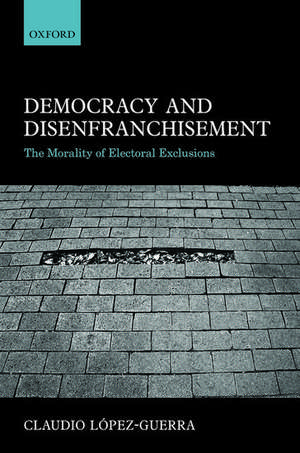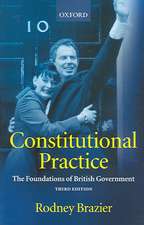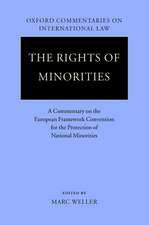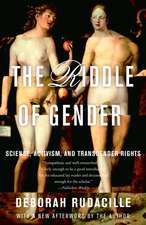Democracy and Disenfranchisement: The Morality of Electoral Exclusions
Autor Claudio López-Guerraen Limba Engleză Hardback – 18 iun 2014
Preț: 597.33 lei
Preț vechi: 857.92 lei
-30% Nou
Puncte Express: 896
Preț estimativ în valută:
114.30€ • 119.34$ • 94.60£
114.30€ • 119.34$ • 94.60£
Carte tipărită la comandă
Livrare economică 24-31 martie
Preluare comenzi: 021 569.72.76
Specificații
ISBN-13: 9780198705789
ISBN-10: 0198705786
Pagini: 200
Dimensiuni: 162 x 240 x 20 mm
Greutate: 0.46 kg
Editura: OUP OXFORD
Colecția OUP Oxford
Locul publicării:Oxford, United Kingdom
ISBN-10: 0198705786
Pagini: 200
Dimensiuni: 162 x 240 x 20 mm
Greutate: 0.46 kg
Editura: OUP OXFORD
Colecția OUP Oxford
Locul publicării:Oxford, United Kingdom
Recenzii
The book is well written and accessible. The relevant topic and the approach to the topic mean that the book is of interest and comprehensible not just to philosophers and political scientists, but also to individuals with less background knowledge of the theme of suffrage. ... López-Gurra argues his case passionately; his arguments are balanced.
Claudio López-Guerra?s Democracy and Disenfranchisement is a fascinating book that challenges most people?s basic assumptions about who ought to have the right to vote ... breath of fresh air.
In this provocative book, Claudio López-Guerra argues that many of our conventional beliefs about the franchise are entirely backward. ... As is evident, this is an ambitious book and there is much of interest ... Even if some or all of [Lopez-Guerra's arguments] are flawed, they are instructive insofar as they require us to reconsider the value of the franchise and the reasons for which it should be bestowed.
[T]he more attractive element of the book is the simplicity with which the author carries out a critical but systematic reading of all aspects of the universal suffrage principle by presenting interesting and thought-provoking ideas. This book should be considered both by those interested generally in the political philosophy of elections and those interested in reading a thoughtful and critical analysis of the many categories of exclusion/inclusion that configure the rules of the franchise.
The discussion of these subjects is well done . . . the chapter on felon disenfranchisement I recommend as especially cogent and thorough . . . [Universal suffrage] is not to be replaced with other means of political participation and not to be traded for the promise of better electoral results. This seems like a hard intuition to dislodge - and most of López-Guerra's book works for rather than against it. But it is to López-Guerra's credit that parts of his tightly argued book (a welcome addition to the regrettably slim library on the subject) may move us to cling to this notion a little less firmly.
In Democracy and Disenfranchisement, Claudio Lopez-Guerra challenges our conventional understanding of the vote as a fundamental right, and poses crucial questions about the scope of the franchise. Should expatriates or non-citizen residents have the right to vote? Should felons? Should children? Through rigorous analysis of the logic of institutional design, Lopez-Guerra presses us to reconsider our views on some of the most important moral and political issues of our time. The book is a deeply impressive contribution to democratic theory.
Lopez-Guerra analyzes the moral foundations of the right to vote with rigor and ingenuity. By shifting the focus to reasons for denying the right, he casts new light on reasons for granting it. Against the grain, he argues that the right is not fundamental and may be denied to some who now enjoy it. But he also shows why it should be granted to many who are now disenfranchised. Democracy and Disenfranchisement will challenge anyone who would think seriously about who should have the right to vote.
Claudio López-Guerra?s Democracy and Disenfranchisement is a fascinating book that challenges most people?s basic assumptions about who ought to have the right to vote ... breath of fresh air.
In this provocative book, Claudio López-Guerra argues that many of our conventional beliefs about the franchise are entirely backward. ... As is evident, this is an ambitious book and there is much of interest ... Even if some or all of [Lopez-Guerra's arguments] are flawed, they are instructive insofar as they require us to reconsider the value of the franchise and the reasons for which it should be bestowed.
[T]he more attractive element of the book is the simplicity with which the author carries out a critical but systematic reading of all aspects of the universal suffrage principle by presenting interesting and thought-provoking ideas. This book should be considered both by those interested generally in the political philosophy of elections and those interested in reading a thoughtful and critical analysis of the many categories of exclusion/inclusion that configure the rules of the franchise.
The discussion of these subjects is well done . . . the chapter on felon disenfranchisement I recommend as especially cogent and thorough . . . [Universal suffrage] is not to be replaced with other means of political participation and not to be traded for the promise of better electoral results. This seems like a hard intuition to dislodge - and most of López-Guerra's book works for rather than against it. But it is to López-Guerra's credit that parts of his tightly argued book (a welcome addition to the regrettably slim library on the subject) may move us to cling to this notion a little less firmly.
In Democracy and Disenfranchisement, Claudio Lopez-Guerra challenges our conventional understanding of the vote as a fundamental right, and poses crucial questions about the scope of the franchise. Should expatriates or non-citizen residents have the right to vote? Should felons? Should children? Through rigorous analysis of the logic of institutional design, Lopez-Guerra presses us to reconsider our views on some of the most important moral and political issues of our time. The book is a deeply impressive contribution to democratic theory.
Lopez-Guerra analyzes the moral foundations of the right to vote with rigor and ingenuity. By shifting the focus to reasons for denying the right, he casts new light on reasons for granting it. Against the grain, he argues that the right is not fundamental and may be denied to some who now enjoy it. But he also shows why it should be granted to many who are now disenfranchised. Democracy and Disenfranchisement will challenge anyone who would think seriously about who should have the right to vote.
Notă biografică
Claudio López-Guerra's work focuses on political ethics. He has published articles in academic journals such as The Journal of Political Philosophy; Politics, Philosophy and Economics; and Social Theory and Practice. He is Research Professor of Political Studies, Center for Research and Teaching in Economics (CIDE) in Mexico City.











